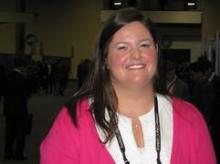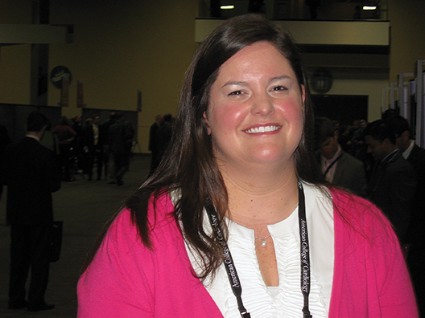User login
WASHINGTON – Preparticipation 12-lead ECG screening of school age athletes didn’t cause an increase in anxiety levels, regardless of race, sex, or age, in a large study.
Skeptics of ECG screening of young athletes to identify those with occult hypertrophic cardiomyopathy and other conditions of interest have raised the specter that false-positive results in mass screening programs would cause waves of needless anxiety. But this assertion has not been formally evaluated until now, Dr. Mallory Irwin said at the annual meeting of the American College of Cardiology.
Dr. Irwin of the department of family medicine at the University of Tennessee, Knoxville, presented a prospective multisite study involving 1,504 athletes in 18 sports at 22 high schools, all of whom underwent precompetition cardiovascular screening by history, physical exam, and 12-lead ECG. Those with a positive screen got an on-site echocardiographic examination. As part of the study, all athletes also received pre- and postscreen validated psychological assessments focusing on anxiety, health attitudes, and the impact of screening on sports participation.
Of the athletes, 76% had a normal screen, 23% had what proved to be a false-positive screen, and just under 1% were diagnosed with a major or minor cardiac disorder.
Overall, athletes didn’t report feeling anxiety during the screening. There was no difference in anxiety level between those with a normal screen, compared with athletes with a false-positive screen. Anxiety levels in athletes with a false-positive screen were similar, regardless of whether the false-positive finding was based upon the ECG, physical exam, or history. Those with a false-positive screen said afterward that they would still recommend routine preparticipation ECG screening, and that the more intensive work-up they got based upon the screening result would have a positive impact on their training because of the extra measure of reassurance it provided.
"Undue anxiety due to false-positive screens does not appear to be a justified reason to oppose ECG screening," Dr. Irwin said.
The 0.9% of athletes who were diagnosed with a cardiac condition did have higher anxiety levels after receiving their diagnosis, but they also expressed a conviction that all athletes should have an ECG prior to sports competition, she added.
Before undergoing screening, the female athletes expressed a significantly greater preference for knowing about any underlying cardiac condition, compared with their male counterparts. The black athletes were as a group less concerned about and less interested in cardiovascular screening than were the white athletes.
The standardized history and physical exam used in the study were based on American Heart Association guidelines. The 12-lead ECG interpretation relied upon the 2013 Seattle criteria.
This study was funded in part by an American Medical Society for Sports Medicine Young Investigator Research Grant to Dr. Irwin, who reported having no financial conflicts.
WASHINGTON – Preparticipation 12-lead ECG screening of school age athletes didn’t cause an increase in anxiety levels, regardless of race, sex, or age, in a large study.
Skeptics of ECG screening of young athletes to identify those with occult hypertrophic cardiomyopathy and other conditions of interest have raised the specter that false-positive results in mass screening programs would cause waves of needless anxiety. But this assertion has not been formally evaluated until now, Dr. Mallory Irwin said at the annual meeting of the American College of Cardiology.
Dr. Irwin of the department of family medicine at the University of Tennessee, Knoxville, presented a prospective multisite study involving 1,504 athletes in 18 sports at 22 high schools, all of whom underwent precompetition cardiovascular screening by history, physical exam, and 12-lead ECG. Those with a positive screen got an on-site echocardiographic examination. As part of the study, all athletes also received pre- and postscreen validated psychological assessments focusing on anxiety, health attitudes, and the impact of screening on sports participation.
Of the athletes, 76% had a normal screen, 23% had what proved to be a false-positive screen, and just under 1% were diagnosed with a major or minor cardiac disorder.
Overall, athletes didn’t report feeling anxiety during the screening. There was no difference in anxiety level between those with a normal screen, compared with athletes with a false-positive screen. Anxiety levels in athletes with a false-positive screen were similar, regardless of whether the false-positive finding was based upon the ECG, physical exam, or history. Those with a false-positive screen said afterward that they would still recommend routine preparticipation ECG screening, and that the more intensive work-up they got based upon the screening result would have a positive impact on their training because of the extra measure of reassurance it provided.
"Undue anxiety due to false-positive screens does not appear to be a justified reason to oppose ECG screening," Dr. Irwin said.
The 0.9% of athletes who were diagnosed with a cardiac condition did have higher anxiety levels after receiving their diagnosis, but they also expressed a conviction that all athletes should have an ECG prior to sports competition, she added.
Before undergoing screening, the female athletes expressed a significantly greater preference for knowing about any underlying cardiac condition, compared with their male counterparts. The black athletes were as a group less concerned about and less interested in cardiovascular screening than were the white athletes.
The standardized history and physical exam used in the study were based on American Heart Association guidelines. The 12-lead ECG interpretation relied upon the 2013 Seattle criteria.
This study was funded in part by an American Medical Society for Sports Medicine Young Investigator Research Grant to Dr. Irwin, who reported having no financial conflicts.
WASHINGTON – Preparticipation 12-lead ECG screening of school age athletes didn’t cause an increase in anxiety levels, regardless of race, sex, or age, in a large study.
Skeptics of ECG screening of young athletes to identify those with occult hypertrophic cardiomyopathy and other conditions of interest have raised the specter that false-positive results in mass screening programs would cause waves of needless anxiety. But this assertion has not been formally evaluated until now, Dr. Mallory Irwin said at the annual meeting of the American College of Cardiology.
Dr. Irwin of the department of family medicine at the University of Tennessee, Knoxville, presented a prospective multisite study involving 1,504 athletes in 18 sports at 22 high schools, all of whom underwent precompetition cardiovascular screening by history, physical exam, and 12-lead ECG. Those with a positive screen got an on-site echocardiographic examination. As part of the study, all athletes also received pre- and postscreen validated psychological assessments focusing on anxiety, health attitudes, and the impact of screening on sports participation.
Of the athletes, 76% had a normal screen, 23% had what proved to be a false-positive screen, and just under 1% were diagnosed with a major or minor cardiac disorder.
Overall, athletes didn’t report feeling anxiety during the screening. There was no difference in anxiety level between those with a normal screen, compared with athletes with a false-positive screen. Anxiety levels in athletes with a false-positive screen were similar, regardless of whether the false-positive finding was based upon the ECG, physical exam, or history. Those with a false-positive screen said afterward that they would still recommend routine preparticipation ECG screening, and that the more intensive work-up they got based upon the screening result would have a positive impact on their training because of the extra measure of reassurance it provided.
"Undue anxiety due to false-positive screens does not appear to be a justified reason to oppose ECG screening," Dr. Irwin said.
The 0.9% of athletes who were diagnosed with a cardiac condition did have higher anxiety levels after receiving their diagnosis, but they also expressed a conviction that all athletes should have an ECG prior to sports competition, she added.
Before undergoing screening, the female athletes expressed a significantly greater preference for knowing about any underlying cardiac condition, compared with their male counterparts. The black athletes were as a group less concerned about and less interested in cardiovascular screening than were the white athletes.
The standardized history and physical exam used in the study were based on American Heart Association guidelines. The 12-lead ECG interpretation relied upon the 2013 Seattle criteria.
This study was funded in part by an American Medical Society for Sports Medicine Young Investigator Research Grant to Dr. Irwin, who reported having no financial conflicts.
AT ACC 14
Major finding: Precompetition cardiac screening of high school athletes via 12-lead ECG, history, and physical exam did not result in excessive anxiety, even in the 23% with what proved to be a false-positive result.
Data source: A prospective study of 1,504 athletes participating in 18 sports at 22 high schools who underwent standardized preparticipation cardiovascular screening as well as validated pre- and postscreen psychological assessments.
Disclosures: The study was partially funded by an American Medical Society for Sports Medicine Young Investigator Research Grant to the presenter, who reported no financial conflicts.

